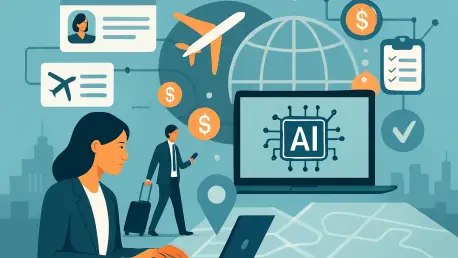Imagine a world where corporate travel is seamlessly managed by intelligent systems that predict needs, optimize costs, and enhance traveler experiences with uncanny precision, yet the reality for many companies remains a struggle to harness this potential while facing significant obstacles. Artificial intelligence (AI) has emerged as a game-changer in the corporate travel industry, promising to revolutionize how businesses plan and execute trips. However, despite its rapid adoption, significant hurdles persist in turning promise into performance. Industry insights shared at a prominent business travel event reveal that while AI is becoming a cornerstone of operations for many organizations, the path to effective implementation is fraught with complexity. The discussion highlights a critical dichotomy: widespread enthusiasm for AI’s capabilities contrasted with a sobering rate of project failures. This dynamic sets the stage for a deeper exploration into how AI is reshaping corporate travel and what challenges must be overcome to unlock its full benefits.
Navigating the Highs and Lows of AI Adoption
The surge in AI adoption within corporate travel is undeniable, with a substantial 75% of industry professionals integrating this technology into their operations, as reported by experts in the field. Yet, beneath this impressive statistic lies a stark reality: an overwhelming 95% of corporate AI initiatives fail, according to research from a leading academic institution. This staggering discrepancy points to a fundamental issue—adoption alone does not equate to success. Industry leaders emphasize that the key to overcoming this gap lies in strategic planning and unwavering commitment from top management. AI is not merely a plug-and-play tool but a sophisticated skill set that demands continuous learning and adaptation. Companies must move beyond superficial integration and focus on embedding AI into their core processes with clear intent. Without such dedication, the risk of failure looms large, leaving organizations unable to capitalize on AI’s potential to streamline travel management and improve efficiency across the board.
Strategic Implementation for Lasting Impact
Looking back, the journey of AI in corporate travel reflected a landscape of both innovation and caution, where strategic alignment proved to be the linchpin of success. Tailoring AI applications to specific needs was critical, whether enhancing traveler productivity through intuitive chatbots or developing forward-thinking tools like TAMI, an AI assistant crafted to anticipate future demands. Experts consistently highlighted that a clear vision, grounded in human insight, was essential to guide AI integration toward broader business goals. The past showed that challenges were met not just with technology, but with deliberate customization and organizational buy-in. As the industry moved forward, the lesson was clear: success hinged on continuous innovation and structured efforts. Companies were encouraged to prioritize actionable strategies, ensuring AI served as a true partner in travel management. The focus shifted to building frameworks that supported long-term growth, offering a roadmap for navigating complexities and achieving transformative outcomes in corporate travel.









